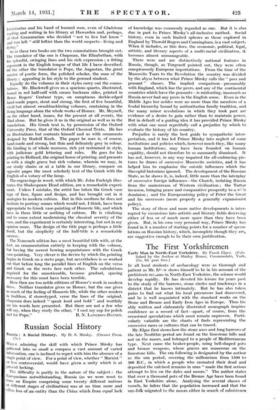Russian Social History
Russia : A Social History. By D. S. Mirsky. (Cresset Preis. 25s.)
IVniLE admiring the skill with which Prince Mirsky has gathered into so small a compass a vast amount of varied information, one is inclined to regret with him the absence of a Single point of view. For a point of view, whether " Marxist " or less controversial, would- have given a unity which is at Present lacking. • - The difficulty is partly in the nature of the subject : the Eurepasians notwithstanding, Russia (as we were wont to term an Empire comprising some twenty different nations at different stages of civilization) was at no time more and often less of an' entity than the China which from equal lack of knowledge was commonly regarded as one. But it is alsci due in part to Prince Mirsky's all-inclusive method. Social history, even in such limited spheres as those explored in England by Thorold Rogers and Cunningham, is a vast subject. When it includes, as this does, the economic, political, legal, artistic, and literary aspects of a multi-racial civilization, it becomes almost unmanageable.
There were and are distinctively national features in Russia, though, as Turgeneff pointed out, they were often conspicuously European importations. From the time of the Muscovite Tsars to the Revolution the country was divided by the abyss between what Prince Mirsky calls the " peer and peasant " classes. The implied comparison—presumably with England, which has the peers, and any of the continental countries which have the peasants—is misleading, inasmuch as Russia never had any peers in the English sense. Even in the Middle Ages her nobles were no more than the members of a feudal hierarchy bound by authoritarian family tradition, and the many minor revolutions in which they took part are evidence of a desire to gain rather than to maintain power. But in default of a guiding idea it has provided Prince Mirsky with what one must regretfully call a prejudice by which to evaluate the history of his country.
Prejudice is rarely the best guide to sympathetic inter-. pretation, and it has led Prince Mirsky into neglect of some institutions and policies which, however much they, like many human institutions, may have been founded on human cupidity, should not therefore be so summarily dismissed. It has not, however, in any way impaired the all-embracing pic- tures he draws of successive Muscovite societies, and it has helped him to emphasise the outside influences which the Slavophil historians ignored. The development of the Russian State, as lie shows it, is, indeed, little more than the interplay of successive foreign influences—the Church, isolating Russia from the mainstream of Western civilization ; the Tartar invasion, bringing peace and comparative prosperity to a wi dominion ; and the Europeanizing policy of Peter the Great and his successors (more properly a generally expansionist policy).
The story of these and more native developments is inter- rupted by excursions into artistic and literary fields deserving either of less or of much more space than they have been given. But, in his own very personal way, Prince Mirsky has found in it a number of starting points for a number of specu. lations on Russian history, which, incomplete though they are, are suggestive enough to be their own justification.























































 Previous page
Previous page